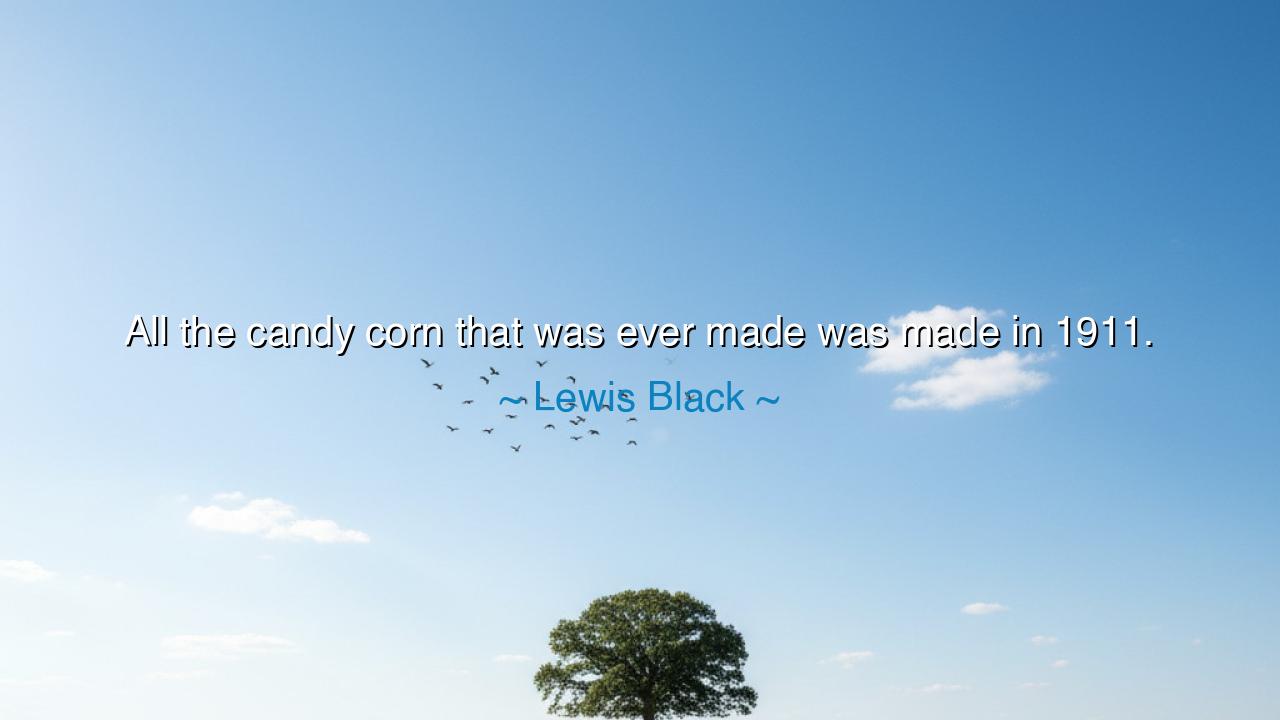
All the candy corn that was ever made was made in 1911.






“All the candy corn that was ever made was made in 1911.” — with this line, Lewis Black, master of sardonic humor and moral exaggeration, strikes at more than confectionery; he speaks of time, decay, and the illusions of progress. His words, delivered in jest, conceal a grim truth about the nature of human nostalgia and the stubborn endurance of things that ought to have faded. To laugh at the image — of endless, ageless candy corn haunting generation after generation — is to glimpse the absurd persistence of what is outdated yet refuses to die.
In his quote, Black mocks not just the candy itself but the illusion of renewal. Candy corn, that perennial survivor of autumn’s celebrations, tastes as though it were never fresh, as though each kernel were unearthed from some eternal, sugary tomb. By claiming that “all the candy corn was made in 1911,” he exaggerates this sense of staleness and immortality — that what once seemed sweet has become a relic, endlessly repackaged, yet never reborn. His humor becomes a metaphor for the human condition: we, too, recycle the same traditions, habits, and false pleasures, pretending they are new, even as they crumble with age.
This style of humor — the hyperbolic truth — echoes the ancient art of satire, once wielded by philosophers and playwrights to awaken moral awareness through laughter. Like Aristophanes mocking the folly of Athens or Juvenal deriding the corruption of Rome, Lewis Black turns triviality into revelation. In the candy corn, he sees the symbol of permanence without purpose, the hollow endurance of mediocrity. The world, he suggests, is filled with things that should have perished long ago but linger — institutions, customs, ideas — their flavor long gone, yet their presence unshakable.
To understand his satire, one might recall the decline of ancient empires, where decay masqueraded as glory. The Roman Senate, long after the Republic had died, still gathered beneath marble pillars, pretending to hold power while emperors ruled from the shadows. Their rituals, like candy corn, persisted without life. So too, in every age, humanity clings to its old sweets — comforts that have lost their sweetness, habits that have lost their meaning — merely because they are familiar. Black’s humor, though modern in form, carries the same warning the ancients once whispered: beware of the dead things that still walk among the living.
Yet in this jest there is also compassion. For to laugh at the absurdity of candy corn is to acknowledge a gentler truth — that we are creatures of sentiment, haunted by our own history. Candy corn remains because it reminds us of childhood, of simpler seasons, of autumn fairs and Halloween nights when wonder outshone taste. Black’s bitterness is only half the story; beneath it lies an understanding that memory, even when stale, is precious. The heart clings to what the tongue rejects, and so the past endures, not because it is good, but because it is ours.
Still, his jest invites us to awaken — to discern what is truly timeless from what merely refuses to die. There are things in life worth preserving: kindness, beauty, courage, love. And there are others, like candy corn, that endure out of inertia rather than value. The wise must learn to separate nostalgia from nourishment, to ask whether what we keep still feeds the soul, or merely fills the shelves of habit.
The lesson, then, is both humorous and profound: laughter can reveal truth more powerfully than lamentation. When Lewis Black declares that all candy corn was made in 1911, he is not speaking of candy but of the human reluctance to let go. His absurdity becomes a mirror — reflecting our attachment to the old, our fear of change, our worship of the familiar even when it has lost its sweetness.
So remember, O listener of future days — laugh, but also reflect. When you encounter the candy corn of your own life — the old beliefs, the worn-out customs, the habits that no longer nourish — dare to ask whether they still deserve a place in your world. For, as Lewis Black teaches through satire, not all that endures is eternal. Some things survive not because they are immortal, but because we have forgotten to let them rest. And wisdom begins, perhaps, when we finally learn to taste the past — and decide whether it still deserves our hunger.






AAdministratorAdministrator
Welcome, honored guests. Please leave a comment, we will respond soon